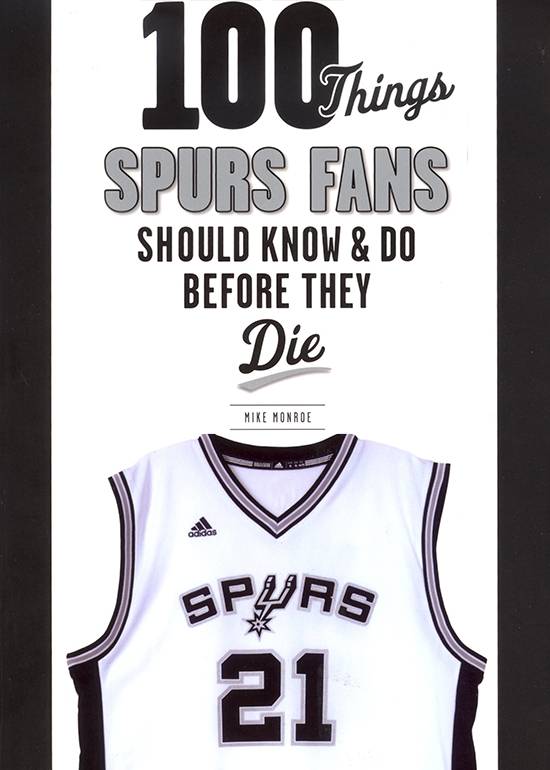
100 Things Spurs Fans Should Know & Do Before They Die
by Mike Monroe
Chicago: Triumph Books, 2016.
288 pp. $14.95 paper.
Reviewed by
Robert P. Moreira
“Monroe’s collection is an homage to the Spurs through that vintage sports adage: one fan’s heartbreak is another fan’s elation. In the end, 100 Things is a volume that even non-basketball fans can appreciate and learn from, an easy read worth its paperback price tag.”
After reading Mike Monroe’s 100 Things Spurs Fans Should Know and Do Before They Die, an image from the past materializes. No, it is not one of Clayton Kershaw or Carli Lloyd sucking teeth at me for disloyalty and engaging in a different sport than theirs. The image gathers in stereo, and it is of my cousin, Carlos, jumping off the couch and that yawp at the top of his lungs on May 15, 2003—“NO!” Carlos grew up a diehard Los Angeles Lakers fan, you see, and that evening represented one of the darkest nights in Lakers history. Not only were Kobe Bryant and company eliminated from the 2003 NBA Western Conference semifinals, but they were ousted by their hated Texan rivals: the San Antonio Spurs. In 100 Things, Monroe memorializes this occurrence by including it as No. 41 in his list of Spurs’ feats, much to the chagrin of my cousin and all other Lakers lovers. While I won’t be sending a copy of 100 Things to my cousin back in California, Monroe’s collection is an homage to the Spurs through that vintage sports adage: one fan’s heartbreak is another fan’s elation. In the end, 100 Things is a volume that even non-basketball fans can appreciate and learn from, an easy read worth its paperback price tag.
Like other volumes in the Triumph Books series (the Los Angeles Dodgers collection sits in my own library), 100 Things is a Spurs’ compendium that includes the following: individual and team achievements, heartbreaks, and blunders; player, coach, and owner biographies and nicknames; historic rivalries, players, and championship runs. For the uninitiated in basketball (or even more specifically in San Antonio Spurs lore) the book offers a plethora of knowledge—there are facts, histories, and statistics, of course, and Monroe’s use of this particular term makes it all less daunting—enough to impress any seasoned Spurs’ fan once a page or two are set to memory. These “things” include the following, ranked by Monroe in order of importance:
Number 1: Detailed statistics of Spurs legend and No. 1 overall draft pick in 1997, Tim Duncan, along with his exploits over an amazing nineteen-season career.
Number 4: A biography of head coach Gregg Popovich, one of the most successful coaches in NBA history (1150 wins, 506 losses all-time), who led the Spurs to NBA Championships in 1999, 2003, 2005, 2007, and 2014.
Number 32: The sale of the Spurs to General Robert McDermott and other business owners in 1996, which eventually led to the hiring of Greg Popovich as head coach.
Number 73: Argentine Manu Ginóbili’s foul of the Dallas Mavericks’ Dirk Nowitzki during Game Six in the second round of the 2006 NBA Playoffs. The foul would prove costly as it allowed the Mavericks to tie, then eventually go on to win the game.
Number 94: An unprecedented $250,000 fine served to the Spurs organization for making four of their top players—including Duncan, Tony Parker, and Manu Ginóbili—unavailable for an early season game. According to David Stern, NBA Commissioner, this act “did a disservice to the league and our fans”.
Number 99: Greg Popovich’s “oenological” interests outside of basketball, and the success of his “Rock and Hammer” pinot noir.
In addition to these six tidbits, ninety-four other facts, biographies, and histories regale the pages of 100 Things, enough to make the serious Spurs fan smile, and all haters scowl. For diehard Spurs’ aficionados, No. 100 is entitled “Take This Ultimate Spurs Fan Trivia Quiz,” with Question Four posing the following query: Who was the first Australian to play for the Spurs? Don’t know, Spurs’ devotees? No need to get discouraged—you’ll find the answers to all the questions on the cheat sheet on page 276.
When all is said and done, 100 Things may score a slam dunk for its wealth of Spurs information, but I must say it reads like a scattered, sprawling litany of facts with no real trajectory. Monroe disclaims this specific criticism in his introduction, stating that the sequencing in the book “wasn’t easy” for him. I’m left wondering, however, if a chronological sequencing may have suited the book better, detailing the franchise’s earliest days up to the present, then supplementing these with key biographies and statistics. Finally, even in today’s tight-budgeted publishing landscape, color photos (instead of the few included in black and white) would have served 100 Things well.
Robert P. Moreira is the editor of ¡Arriba Baseball!: A Collection of Latin@ Baseball Fiction (VAO Publishing, 2013) and author of Scores (Broken River, 2015), winner of the 2016 NACCS Tejas Fiction Award. For more information, visit his personal website.
